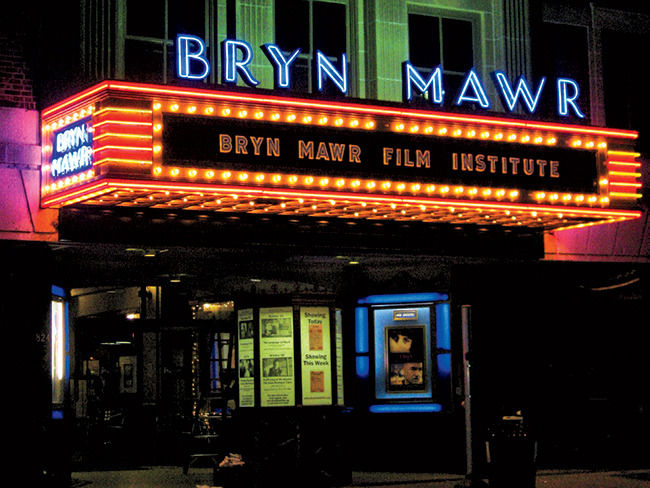Bryn Mawr Film Institute: A Main Line Cultural Staple
October 4, 2017
On the surface, the Bryn Mawr Film Institute located on West Lancaster Avenue appears to be a simple and unassuming independent theater. However, from the moment one steps inside this historic place, it is clear that there is far more than meets the eye. Though modest in size, the Institute boasts a grand and elegant entrance reminiscent of Grand Central Station, remarkably high ceilings complete with stunning atrium skylights, a second floor with a balcony that overlooks the entryway, four theaters and a café—Hothouse Coffee—that opens onto the entrance. Essentially, it looks like a scene transported from Manhattan’s urban and artistic Chelsea Market, or its Theatre District, and its essence is just as sophisticated and unique.
BMFI is defined by more than just its striking aesthetics. In fact, the theater has a long and storied history. BMFI was born of the Bryn Mawr community’s call to save the historic Seville Theater, which had been in existence since 1926 and faced bankruptcy by the beginning of the new millennium. When BMFI took over the building that was once the Seville, it rebuilt the theater to be the modern beacon of culture for the Main Line that it has become. But it is more than just a theater; it is a space that is, according to the mission statement posted on their website, “dedicated to promoting shared experiences that entertain, engage and educate audiences through a diverse range of independent-minded films, a full curriculum of courses, and an extensive program of special events.”
One obvious way in which BMFI fulfills this mission is by featuring a wide range of films of all genres. From the most recently released movies—like the historical comedy “Battle of the Sexes,” which is currently playing at BMFI—to classics like “The Sound of Music,” foreign gems like “Cinema Paradiso” and children’s films like “Trolls,” BMFI offers something for everyone. Not only does this broad and all-encompassing film selection set BMFI apart from other ordinary theaters, but what makes it even more original is the various films series it carefully curates. For instance, through October, BMFI will be offering a Halloween inspired film series featuring classics like “The Silence of the Lambs” and “Frankenstein.”
Perhaps the most distinctive feature of the Institute, though, is its various film course offerings. These courses, which are open to the public and members of BMFI at varying costs, are taught by film producers, critics, authors and professors, and they cover a wide range of topics. Some courses, for instance, are offered over a number of weeks and cover broader areas of study such as the basics of screenwriting or the history of film. Others, however, exist either as individual seminars or weekly courses but offer much more specialized areas of focus. One such course, “Cinema Classics Seminar: ‘The Silence of the Lambs,’” will be held as a one-night seminar on Thursday, Oct. 19 and will focus specifically on “The Silence of the Lambs,” paying particular attention to the character of Hannibal Lecter. Other weekly courses of this nature include “The Magic of Disney, Pt. 2,” which will focus on the evolution of Disney Studios, and “From Mr. Chips to Scarface”: The Legacy of ‘Breaking Bad,’” which will study the hit show “Breaking Bad” through philosophical and literary lenses, with regard to its cinematic predecessors, in order to understand the tragic the nature of this show. These courses tackle everything from serial killers to Disney and drug cartels.
Not only are these courses unique in their scope and variety, but the most enticing part about them may just be the fact that you don’t have to be a film student or expert to partake in them. These courses are perfect for, and openly welcome, any film buff who wants to learn more about their favorite film, artist or genre. This openness, then, and BMFI’s commitment to fostering a deeper appreciation and understanding of the art of film, both through the films they feature and the courses they offer, are what make BMFI such an integral part of the Philadelphia region’s art culture. And the passion that pours from this institution for the art in which it finds its identity and purpose, the art of cinema, is something that can be felt and enjoyed by whoever has the privilege to visit and experience BMFI. Even if just for a single night at the movies, a trip to BMFI is anything but ordinary and reminds you just how enchanting cinema can be.












